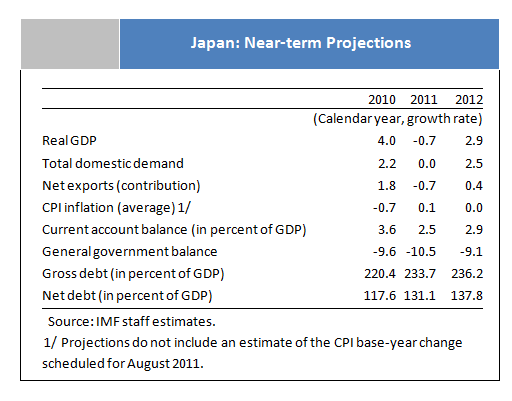
Typical street scene in Santa Ana, El Salvador. (Photo: iStock)
IMF Survey: Japan Set to Recover Sharply, but Disaster Takes Heavy Toll
June 8, 2011
- GDP growth projected at -0.7 percent in 2011, 2.9 percent next year
- IMF supports second supplementary budget to revitalize affected regions
- Delay in fiscal reforms could create spillovers to other countries if yields rise
- Longer term, Japan needs more ambitious strategy to boost growth, lower public debt
Japan’s huge earthquake and devastating tsunami last March have taken a heavy toll on the country’s economy, and even though output will revive in the second half of the year as reconstruction takes hold, the IMF projects overall growth for the year will fall to -0.7 percent this year.

Auto worker in Miyata City, Japan: recovery is projected to continue in 2012, supported by exports, continued public spending (photo: Ken Shimizu/AFP)
ROAD TO RECOVERY
“The Japanese people have shown tremendous resilience in dealing with this terrible tragedy and now in tackling the formidable challenges of reconstruction,” said John Lipsky, the IMF’s Acting Managing Director, on a trip to Tokyo. He announced Japan would hold the 2012 IMF-World Bank Annual Meetings.
The IMF expects economic activity in Japan to bounce back from the twin disasters starting in midyear, as supply constraints ease and reconstruction spending accelerates. The Great East Japan earthquake and tsunami, in which 24,000 people died and thousands of homes were destroyed, created problems with electricity supply and severe manufacturing bottlenecks that also affected countries around the world.
The recovery is projected to continue in 2012, supported by exports and continued public spending. On this basis, the IMF expects GDP growth to rise from -0.7 percent this year to a positive 2.9 percent in 2012 with headline inflation remaining around zero percent in both years (see table).

But Mahmood Pradhan, Senior Advisor in the IMF’s Asia and Pacific Department, who led the Fund’s mission, said that uncertainty surrounding the outlook was unusually high. “Delays in resolving supply disruptions and rebuilding electricity capacity could hold back private consumption and investment, while a slowdown in the advanced economies would weaken Japan’s exports. On the upside, a faster easing of supply constraints could give a lift to exports and investment,” he told reporters.
New emphasis on global spillovers
Lipsky and Anoop Singh, Director of the Asia and Pacific Department, joined the mission at the conclusion of the annual Article IV consultation on the state of the economy.
This year, the IMF is putting additional emphasis on assessing “spillover effects” from one country to another. Lipsky said at the Tokyo press conference the analysis was “an important innovation we introduced to strengthen our surveillance in the wake of the global financial crisis.”

Lipsky at Tokyo news conference: “Early and credible action is essential to secure the long-term health of Japan’s public finances” (IMF photo)
The IMF is focusing its spillover analysis on the world’s largest economies—Japan, China, the United States, the euro area, and the United Kingdom. Lipsky was in London on June 6 for release of the U.K.’s annual health check and he will be in China June 9–10.
“The government’s fiscal response to the earthquake has been appropriately focused on relief and reconstruction efforts,” Lipsky said. “At the same time, early and credible action is essential to secure the long-term health of Japan’s public finances. A failure to bring about needed fiscal adjustment would affect growth prospects in Japan and overseas if it resulted in a sharp rise in government bond yields, a concern that has been communicated by other countries participating in the spillover exercise.”
Costs of reconstruction
Reconstruction costs could range between 2–4 percent of GDP, spread over several years, the IMF said. It supported additional spending by the government to help revive the economy. The Japanese government had moved quickly to pass its first supplementary budget of around 0.8 percent of GDP to address immediate needs. “Timely passage of a second, sizable supplementary budget well targeted at and focused on revitalizing the affected regions would help address downside risks and catalyze private spending,” the IMF said.
But it cautioned about building up more debt, arguing among various tax measures in favor of a moderate increase in the consumption tax, starting in 2012 when the cyclical recovery is under way. “The alternative, relying mainly on debt financing would add to fiscal risks stemming from an already high level of public debt, which at over 220 percent of GDP in gross terms is the highest among advanced economies,” the IMF said.
To maintain confidence in public finances, Japan needed a more ambitious strategy for bringing down public debt. Additional easing of credit conditions by the Bank of Japan and an acceleration of structural reforms would also support a robust recovery.
Financial and structural policies to promote growth
Financial policies should protect against risks of an economic slowdown and higher market volatility. A delayed recovery could raise banks’ credit costs, especially for loans to smaller firms. Banks also face risks from their large holdings of equities and government bonds. To strengthen the resilience of the financial system, supervisors should encourage weak banks to improve their capital base and take early action against distressed borrowers.
The IMF team also looked at how Japan might raise growth over the longer term. Further trade liberalization, such as through the proposed Trans-Pacific Partnership, could open the door to new export markets and promote regulatory reforms of services and agriculture.
Policies to boost employment are particularly important, focusing on raising labor participation by the young, female, and elderly workers. Deeper financial markets and further regional integration would also help raise output in Japan and its Asian neighbors.
Comprehensive fiscal and structural reforms in Japan would also benefit the rest of the world. Lower public debt would contribute to stability in government bond markets and provide savings to reduce global interest rates, while growth-enhancing reforms would strengthen global demand, the IMF mission said.


